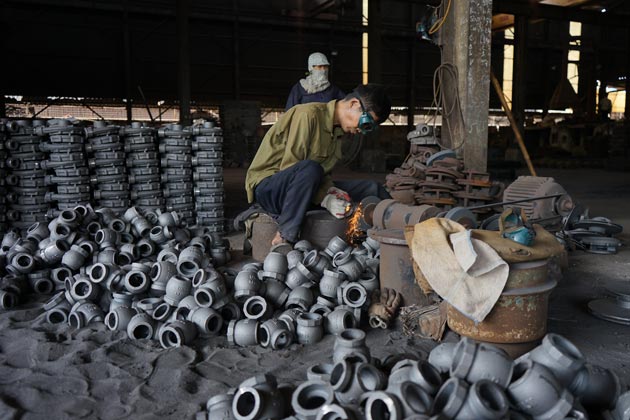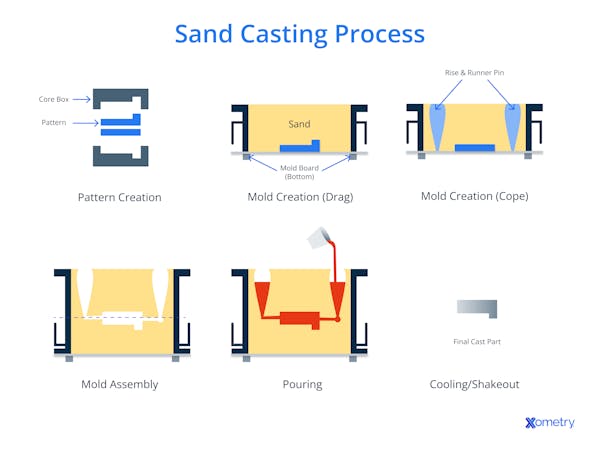Recognizing the Conveniences and Innovations in the Aluminum Foundry Industry
The Aluminum Foundry sector plays a necessary function in modern manufacturing. Its lightweight buildings significantly boost gas efficiency, particularly in aerospace and automotive markets. Additionally, Aluminum's resistance to rust warranties long life in various applications. As the industry develops, technologies such as sophisticated recycling and additive manufacturing are reshaping manufacturing techniques. Discovering these advancements reveals not only the benefits yet likewise the difficulties in advance for Aluminum factories in a quickly changing market.
The Lightweight Benefit of Aluminum
Aluminum's lightweight nature offers substantial advantages throughout different markets, particularly in production and transportation. Its reduced thickness enables the manufacturing of components that are easier to install and take care of, causing minimized labor prices and enhanced performance. In the automotive industry, lighter automobiles add to enhanced fuel economy and reduced emissions, straightening with worldwide sustainability goals. Similarly, in aerospace, the use of Aluminum decreases the total weight of airplane, which is important for improving efficiency and reducing operational costs.
Additionally, Aluminum's light-weight properties assist in innovative styles that were previously impractical with heavier materials. This adaptability enables makers to create complicated forms and frameworks while keeping architectural integrity. In general, the lightweight advantage of Aluminum not just enhances product efficiency but likewise drives improvements in innovation and design, making it a recommended material in different applications.
Deterioration Resistance and Durability
The Aluminum Foundry industry is renowned for creating products with exceptional rust resistance, making them ideal for different applications. This building, incorporated with enhanced structural honesty, adds to the durable efficiency advantages that Aluminum elements offer. Because of this, industries progressively rely upon Aluminum to meet demanding ecological conditions without compromising high quality.
Superior Corrosion Resistance
While numerous steels face significant challenges from ecological variables, Aluminum attracts attention for its remarkable deterioration resistance, making it a preferred option in several applications. This home is mostly because of an all-natural oxide layer that forms on the Aluminum surface area, providing a barrier versus wetness and harsh representatives. Unlike other steels that might corrosion or break down with time, Aluminum maintains its stability also in rough environments, such as commercial settings or coastal areas. In addition, its light-weight nature combined with rust resistance makes it ideal for applications in aerospace, vehicle, and marine markets. In general, Aluminum's outstanding durability not only improves product long life yet likewise decreases maintenance prices, providing an engaging benefit for customers and manufacturers alike.
Improved Architectural Integrity
Developers and designers significantly acknowledge the value of enhanced structural stability in modern-day applications, where both rust resistance and sturdiness are important. Aluminum alloys, understood for their lightweight buildings, additionally exhibit extraordinary resistance to deterioration, making them ideal for harsh settings. The innovative strategies employed in the Aluminum Foundry industry contribute significantly to generating parts with enhanced durability. Advanced casting procedures and alloy structures are tailored to fulfill details performance requirements, making sure that structures can endure severe problems without endangering honesty. Surface area treatments and layers enhance the life-span of Aluminum items, better mitigating wear and tear over time. This concentrate on enhanced architectural stability not only extends the usability of materials but additionally reduces upkeep prices, solidifying Aluminum's position as a product of option in various industries.
Long-lasting Performance Conveniences
Lasting performance in Aluminum components is mostly attributed to their remarkable deterioration resistance and durability. Unlike lots of metals, Aluminum normally creates a protective oxide layer, which protects against rust and deterioration in different settings, including aquatic and industrial settings. This fundamental home considerably extends the life-span of Aluminum products, minimizing maintenance and replacement costs. Furthermore, the lightweight nature of Aluminum enhances its applicability across markets without compromising strength. The product's resistance to use and tear also contributes to its reliability in requiring applications, making it an optimal selection for vehicle, aerospace, and construction markets. As industries progressively focus on sustainability and longevity, Aluminum's efficiency advantages align with modern engineering requirements, solidifying its duty in cutting-edge production processes.
Ecological Influence and Sustainability
 As the Aluminum Foundry market progresses, it progressively prioritizes ecological impact and sustainability, acknowledging the requirement for responsible methods despite environment adjustment. Initiatives to lessen waste and energy usage are at the leading edge, with lots of factories embracing reusing initiatives to reclaim Aluminum scrap. This not just minimizes raw material usage yet likewise significantly lowers energy expense, as recycled Aluminum requires only a fraction of the power compared to main production.
As the Aluminum Foundry market progresses, it progressively prioritizes ecological impact and sustainability, acknowledging the requirement for responsible methods despite environment adjustment. Initiatives to lessen waste and energy usage are at the leading edge, with lots of factories embracing reusing initiatives to reclaim Aluminum scrap. This not just minimizes raw material usage yet likewise significantly lowers energy expense, as recycled Aluminum requires only a fraction of the power compared to main production.Innovations in exhausts regulate technologies are being implemented to decrease air toxins, lining up procedures with more stringent environmental guidelines. Shops are also discovering different energy sources, such as solar and wind, to power their facilities sustainably. By cultivating cooperation with stakeholders, the industry intends to develop innovative solutions that improve environmental stewardship. Jointly, these campaigns highlight a commitment to reducing the Aluminum Foundry's carbon footprint while advertising a round economic situation within the manufacturing industry.
Advanced Production Techniques
 Reinventing production procedures, the Aluminum Foundry industry is increasingly incorporating sophisticated production methods to improve performance and accuracy. Techniques such as computer system numerical control (CNC) machining and additive manufacturing have become important elements in optimizing production operations. CNC machining allows for high-precision element construction, considerably minimizing product waste and manufacturing time. Additive production opens up new methods for complex geometries and light-weight layouts that were previously challenging to attain.
Reinventing production procedures, the Aluminum Foundry industry is increasingly incorporating sophisticated production methods to improve performance and accuracy. Techniques such as computer system numerical control (CNC) machining and additive manufacturing have become important elements in optimizing production operations. CNC machining allows for high-precision element construction, considerably minimizing product waste and manufacturing time. Additive production opens up new methods for complex geometries and light-weight layouts that were previously challenging to attain.Additionally, the implementation of automation and robotics in Aluminum foundries streamlines procedures, reduces human mistake, and improves employee security. These modern technologies facilitate a more responsive production environment, making it possible for makers to adjust swiftly to market demands. The integration of sophisticated simulation software better boosts the layout and screening stages, causing remarkable product quality. Collectively, these strategies not just improve functional effectiveness yet additionally foster development, placing the Aluminum Foundry industry at the leading edge of modern manufacturing.
Innovations in Reusing Procedures
The Aluminum Foundry sector is not just progressing in producing strategies but is additionally making significant strides in recycling procedures. Developments are emerging to improve the efficiency of recycling techniques, lowering energy intake and improving sustainability. Advanced sorting innovations, such as computerized optical sorting, enable the identification and splitting up of Aluminum from other materials with high accuracy. This leads to a greater high go right here quality of recycled Aluminum, which is necessary for keeping the integrity of the end products.
Closed-loop recycling systems are being carried out, enabling manufacturers to recycle Aluminum scrap within their very own manufacturing procedures. This reduces waste and advertises a circular economy. Additionally, research right into new recycling strategies, such as hydrometallurgical processes, offers the capacity for recouping Aluminum from complex waste streams. These innovations not just add to lowering the carbon impact of the Aluminum Foundry market yet also bolster its economic feasibility in a significantly ecologically conscious market.
Applications Throughout Different Industries
Countless markets are significantly acknowledging the versatility and benefits of Aluminum Foundry items, leading to widespread applications across fields such as auto, aerospace, building and construction, and consumer goods. In the automobile industry, Aluminum castings add to light-weight vehicle layouts, boosting gas performance and performance. Aerospace makers make use of Aluminum parts for their strength-to-weight proportion, important for aircraft frameworks and components.
In construction, Aluminum is preferred for its resilience and resistance to deterioration, making it excellent for window frameworks, roof, and structural supports. Durable goods likewise take advantage of Aluminum Foundry items, as seen in kitchenware, electronics, and packaging, where light-weight and recyclable materials are important.
The adaptability of Aluminum Foundry techniques permits specific requirements and elaborate designs, accommodating the diverse demands of these markets. As a result, Aluminum Foundry items are coming to be important to modern-day production procedures throughout numerous fields.
Future Trends in Aluminum Foundries
As industries remain to progress, Aluminum foundries are positioned to embrace a number of key patterns that promise to enhance efficiency and sustainability. One popular fad is the raising adoption of electronic innovations, including automation and fabricated knowledge, which improve procedures and improve top quality control. In addition, the press towards lasting methods is leading factories to purchase recycling technologies, considerably decreasing waste and energy consumption.
 An additional emerging fad is the usage of innovative alloys and materials, dealing with the expanding demand for long lasting and light-weight elements throughout various industries (Aluminum Foundry). The assimilation of additive manufacturing strategies is anticipated visit this page to transform component layout, offering customization and minimizing lead times.
An additional emerging fad is the usage of innovative alloys and materials, dealing with the expanding demand for long lasting and light-weight elements throughout various industries (Aluminum Foundry). The assimilation of additive manufacturing strategies is anticipated visit this page to transform component layout, offering customization and minimizing lead times.Cooperation with research study institutions is likewise expected to drive advancement, as shops seek to develop brand-new procedures and materials. Aluminum Foundry. Jointly, these trends suggest a transformative future for the Aluminum Foundry industry, aligning with more comprehensive goals of sustainability and effectiveness
Regularly Asked Inquiries
What Are the Normal Prices Related To Aluminum Foundry Manufacturing?
The normal prices connected with Aluminum Foundry manufacturing include raw materials, labor, power, devices maintenance, and overhead costs. These factors collectively influence the general financial investment needed for reliable Aluminum casting operations.
How Does Aluminum Contrast to Various Other Steels in Toughness?
Aluminum, while lighter than many metals, exhibits impressive strength-to-weight proportions. Contrasted to steel, Aluminum is less strong but supplies outstanding corrosion resistance, making it a beneficial choice in applications where weight and toughness are essential.
What Security Measures Remain In Location in Aluminum Foundries?
Precaution in Aluminum shops typically consist of obligatory personal safety devices, air flow systems to regulate fumes, routine tools maintenance, training programs for workers, and adherence to stringent safety guidelines to decrease risks related to liquified metal handling.
Just How Is High Quality Control Managed in Aluminum Casting Processes?
Quality control in Aluminum spreading procedures involves strenuous examinations at numerous stages, consisting of basic material assessment, process surveillance, and end product testing. Methods such as analytical process control and non-destructive screening warranty adherence to industry standards.
What Accreditations Are Vital for Aluminum Foundry Suppliers?
The value of qualifications for Aluminum Foundry suppliers consists of ISO 9001 for top quality management, ISO 14001 for environmental monitoring, and industry-specific requirements like ASTM and SAE, ensuring conformity, safety and security, and dependability in producing processes.
The Aluminum Foundry industry plays an important role in contemporary manufacturing. The Aluminum Foundry sector is renowned for producing products with superior navigate to these guys deterioration resistance, making them optimal for various applications. Revolutionizing manufacturing processes, the Aluminum Foundry industry is increasingly incorporating advanced production strategies to boost effectiveness and precision. The Aluminum Foundry sector is not only progressing in making methods but is likewise making considerable strides in reusing processes. As markets proceed to advance, Aluminum foundries are poised to welcome several vital trends that assure to boost performance and sustainability.